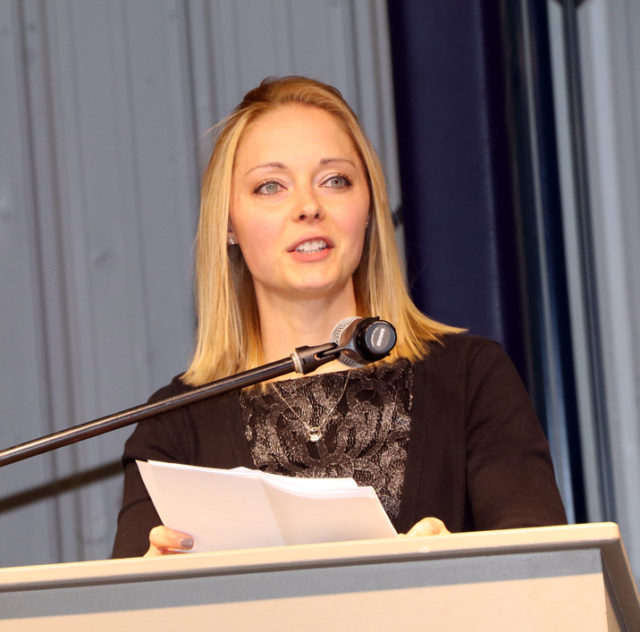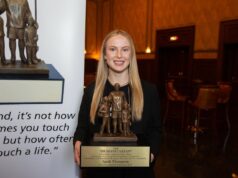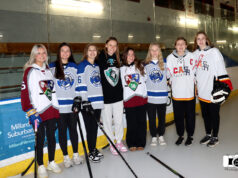There’s a shortage in hockey! It’s not in the locker room, nor is it in management; but it’s both on and off the ice. Everyone aspires to playing the game and after playing days are over many head to behind the bench or “upstairs.”
There’s another avenue to staying in the game.
Officiating!
“There’s a shortage of on and off ice officials,” said Official Dina Allen. “I think its because of the many challenges of it including working it into an already full playing schedule and having to deal with coaches and parents acting inappropriately and berating officials.
“All of us can foster and grow officiating by being patient and understanding of those willing to learn officiating and do the job.
“It is a necessary part of the game,” continued Allen.
A good time to begin the process is when you are young. The problem is that there isn’t time when you are playing to take the time to learn to officiate and then schedule in games to officiate.
However, learning to officiate will also enhance a players game.
Allen began her officiating career after college because it was a good time for her. She had played the game but with beginning her study in law knew she won’t have time to play. She also wanted to make a little extra money. Her husband was an official and so she began her journey into the world of officiating.
“Had I started younger I would have benefitted from it as a player because I would have understood what the refs were seeing and how they interpret the game. That would have given me an advantage,” she said.
Allen, a native of North Tonawanda, played local travel and for the Nichols High School team before heading off to play hockey at Princeton. She played on boys teams through tenth grade and then joined the Syracuse Stars and played senior AAA for the Oakville Ice. At Princeton she led the team in penalty minutes, so she knows a thing or two about hockey rules.
“My first officiating job was a cross ice mite game as a linesman; it was fun,” she remembers.
She officiated at the ECAC D1 level, took USA Hockey regional camps to get certified; took an elite camp for international certification and traveled the world. Then last year she officiated at the highest level at the 2018 Olympics for the women’s hockey competitions.
“Start where you are comfortable, get experience and as you feel more comfortable move up to the levels that are more competitive,” Allen advises.
“The Assigners work with you to find games that you are comfortable with,” she added.
Allen adds that you learn how to manage people and situations. She has also learned about different life styles, cultures and has found camaraderie with the officials as they travel together, which has developed into lasting friendships.
“The biggest take away for younger kids playing is that you learn the game from a completely different perspective,” she said. “It helps you as a player to better understand the game.”
“I think it would be fun to see coaches go through the process and see what they would do from a refs perspective,” she said. “It would be a definite advantage because of the different perspective.”
“It’s a thick rule book!”
How do you start?
Begin by going to the USA Hockey website (www.usahockey.com) click on Officials; then on Become Official and select Register Now. It will take you through the registration process.
While the sessions for this Fall are already completed, check back at the site for upcoming dates.
NYHOL will try and post the dates for each Section of NY as they become available.
The following story on Dina Allen ran in NYHOL after she was selected to work the 2012 IIHF Women’s Worlds in Vermont. In 2018 she worked the Olympics in China. It will give you some insight into refereeing.
Dina Allen is a full-time lawyer which mean she has to settle disputes on a regular basis. So what does she do in her spare time? Why, she serves as a referee for ice hockey, naturally.
While local games are on her schedule regularly, Allen will be one of the referees at the 2012 International Ice Hockey Federation Women’s World’s in Burlington, Vermont in April.
The North Tonawanda resident began her hockey career at age 4. She played on boy’s teams through tenth grade and then joined up with the Syracuse Stars. She played senior AAA hockey for the Oakville Ice of the NWHL, won a USA Hockey national championship with the 19U Syracuse Stars and was invited to the USA Junior National Camp in 2001, 2002 and 2003. She has also played for Brampton and Mississaugua of the NWHL.
The Princeton University graduate also played for her alma mater. She played in 123 games in her Princeton uniform, garnering 70 points. However, in her last three years at Princeton Allen was the leader in penalty minutes, logging 224 minutes in 92 games.
So how do you become one of those referees that put you in the box so many times?
“My husband referred in graduate school and got me interested,” explained Allen.
“It was a way to make some extra money and stay in the game,” she continued. “I knew there weren’t many women officials but I thought I’d try it.”
The process begins with registering with USA Hockey as an official and taking a class. There’s an open rulebook test at the end and from there you start working USA hockey games.
“The opportunities grow from there,” she continued.
“My first USA game was a Mite Cross Ice and I was the linesman,” she remembers. “It was fun.”
Allen continues studying as she attends regional development camps in the summer.
“USA Hockey works hard to develop their officials,” she said. “There are regional, national and elite camps. The Elite Camps get you certified to do international tournaments, such as the IIHF.
“Once you have that you are on the list of officials to get assigned,” she continued.
While you’re in the stands yelling at the officials, the fans aren’t the only ones watching the officials very closely.
“There are supervisors at many of the games that watch us,” she said. “We don’t always know they’re there unless we recognize them. But at the national and international level, they are always there. In fact they meet with us to go over things before the games, questioning us on rules.”
“The more experience you gain the better,” she advises anyone thinking about this as a career move.
“You need to be flexible because you can be called for a game at any time and the development camps are in the summer.
“Generally I know about a game a month in advance, but sometimes you get called the week before, especially during playoffs because no one knows who’s playing who when,” said Allen.
“Working the international tournaments is a great way to meet people from all over the world,” she goes on. “My first international game was in Germany and I was the only American official.
“I enjoy it because I get to learn about their life style, culture and there is a camaraderie among the officials when we are on the road.”
“Refereeing is a fun challenge. You learn how to manage people and situations,” said Allen. “No one is ever happy about a penalty.”
“There are a lot more rules than you know as a player.”
“We need the number of referees to increase and we are trying to grow it. So if someone wants to stay in the game, but is unable to play, this may be the way.”
What about the yelling from the stands and the bench?
“My law career has helped me handle that,” she said smiling.
(Editor’s note: Dina has a husband and two children. Her husband is also a referee and played ice hockey in Lockport. He was recently inducted into the Howell Motors Hockey Hall of Fame located in the Cornerstone Arena in Lockport.







